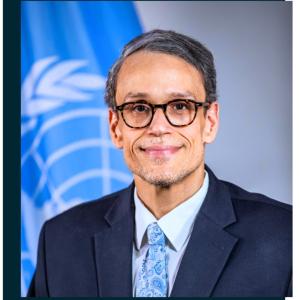Distinguished Guests, Esteemed Colleagues, Ladies and Gentlemen,
Good morning, and welcome to our symposium on "Peace and Prosperity in The Gambia: Problems and Prospects."
As we gather here in the Sir Dawda Kairaba Jawara International Conference Center, we embark on a crucial journey to help shape The Gambia's future – a future of sustainable peace, inclusive prosperity, and resilient democracy.
The story of The Gambia, a country small in size but great in spirit, is a story of transformation and hope.
Yet, this story is not without its challenges.
These challenges—and, more importantly, the opportunities they present—are what bring us together for this critical symposium on "Peace and Prosperity in The Gambia: Problems and Prospects."
Let us begin by acknowledging the remarkable strides The Gambia has made.
Since 2016, we have witnessed a transition that has captured the world's attention. The Gambian people's commitment to democracy, human rights, and the rule of law has been nothing short of inspiring.
However, as we celebrate these achievements, we must confront the stark realities that continue to shape the nation's trajectory.
The challenges we face are complex and interconnected, demanding our collective wisdom and unwavering commitment to overcome them.
Poverty remains a persistent adversary, despite the country’s economic growth. The rising cost of food has further strained household budgets, pushing more families to the brink.
Additionally rapid urbanization and climate shocks present both opportunities and formidable challenges. This has led to heightened inter-community tensions, particularly over land rights.
Challenges that may undermine the country’s peace and social cohesion.
Our task in this Symposium is to explore and suggest how to harness these challenges and turn them into opportunities that will ensure inclusive, sustainable development in The Gambia.
These challenges are not unique to The Gambia.
Across West Africa and indeed the global South, nations are confronting similar issues of economic vulnerability, rapid urbanization, climate change, and governance reforms.
Your discussions here, therefore, have the potential to offer valuable insights not just for The Gambia, but for our entire region and beyond.
It is against this backdrop that we have convened this symposium. Over the next three days, our objectives are threefold:
- First, we will critically assess The Gambia's progress on its National Development Plan. This assessment must be honest and comprehensive, identifying our achievements and the areas where we have fallen short. Only through such candid evaluation can we chart a meaningful path forward.
- Second, we aim to pinpoint the critical obstacles to peace and prosperity in our nation. But identification is not enough. We must propose practical, context-specific solutions that align with the Sustainable Development Goals. This includes addressing the critical issues of social cohesion, national reconciliation, and comprehensive security sector reforms.
- Third, perhaps most importantly, we will formulate concrete policy recommendations. These will inform a comprehensive policy brief that will directly support The Gambia's development agenda and guide future interventions. Your expertise, insights, and commitment to The Gambia's future will be crucial here.
The format of our symposium has been carefully designed to maximise your collective expertise. We will hear presentations from renowned speakers, engage in panel discussions with subject matter experts, participate in breakout sessions for in-depth exploration of specific issues, and come together in plenary sessions to synthesise our findings. This structure ensures that we examine our challenges and opportunities from every angle.
Throughout these discussions, I urge you to remember the key themes guiding our deliberations.
As we grapple with them, I urge you to think boldly and creatively. Challenge assumptions, share best practices, and imagine innovative solutions. Our complex challenges demand nothing less than our collective wisdom and determination.
The United Nations is fully committed to supporting The Gambia in implementing the recommendations from this symposium.
We stand ready to leverage our global expertise and resources to turn your insights into concrete actions.
Our role is that of a partner, not a prescriber.
Gambians must own and drive solutions to The Gambia's challenges.
As we embark on these three days of intense discussion and collaboration, I challenge each of you to approach this symposium as a catalyst for change.
Let us aim for specific, measurable, and actionable outcomes. Our goal should be nothing less than a clear roadmap for enhancing peace and prosperity in The Gambia, with defined roles for all stakeholders.
The path ahead may be challenging, but I am filled with optimism.
The very fact that we are gathered here—policymakers, academics, civil society leaders, and development practitioners—is a testament to our shared commitment to The Gambia's future.
Together, we can chart a course towards a more peaceful, prosperous, and inclusive Gambia—a Gambia that not only achieves its national development goals but also serves as a beacon of hope and progress for West Africa and beyond.
Thank you all. I look forward to three days of vibrant discussion, innovative thinking, and collaborative problem-solving.
Let us make every moment count for the future of The Gambia.


















